- Learning time
- 30 minutes
- First play time
- 80 minutes
Medina
Designed by: Stefan Dorra
In Medina the players constructing palaces, walls and stables as they collaborate on building the famous holy city. The rules are simple, but like many abstract games, the choices are harder to get right.
The board is placed centrally showing the foundations of the city – a grid upon which you will build. Before play begins the well and merchant are placed anywhere in the city – more of those in a moment. Each player is given a certain amount (depending on player number) of palace pieces in the four colours – grey, brown, purple, orange – along with some stables, walls, and merchants. The only pieces in their own colour are the roof pieces that denote that players’ ownership when placed. Everyone hides their pieces behind a player screen.
On your turn you simply place any two of your own pieces on the board – it’s that simple. But obviously there are building guidelines – if a palace is already under construction, you cannot start a second palace of the same colour. Palaces must have one space between them – these form the ‘roads’ of the city. Stables are placed adjacent to palaces, walls go along the edge of the city, and merchants – who represent the market traders – must form a continuous line, so placing merchants means adding them to either end of this line as they weave their way around the city.
All of these elements pertain to how you score your palaces at the end of the game: one point for each ‘building’ (i.e. each section of palace) one point for each adjacent stable, one point for each section of wall and each merchant the palace is next to as well.
The key thing in Medina is the placing of your roofs – because as soon as you place a roof on an unclaimed palace it becomes yours: it’s now considered completed and you can’t add any more palace pieces to it ( – you can still add stables). Having claimed a palace of a certain colour, you now cannot claim another palace of the same colour. Timing of these roof pieces then is everything in the game, as you don’t want anyone else to build a bigger palace (there are bonus points for the largest palace in each colour) but on the other hand, you don’t want to leave placing your roof pieces too late, as the other players will do their best to stymie your building plans with unhelpful placement of their own pieces.
A couple of other things to consider: the first three players to claim a purple palace are rewarded with tea tiles – these allow you to skip a turn, which can be quite helpful in the latter stages of the game… and the first claimed palaces that link to the towers in the corners of the city also claim bonus points, as well as some extra merchants to go in your supply.
Finally, any palaces one space from the well at the end of the game gain 4 bonus points.
The guru's verdict
-
Take That!
Take That!
It's fairly take-that-y actually, as not only can opponents beat you to the punch on claiming a juicy palace, they can also screw with your plans by judicious placement elsewhere... playing with less than four, everyone will also have a 'neutral' roof tile that won't score them points, but will stop other players claiming a palace.
-
Fidget Factor!
Fidget Factor!
Towards the end of the game there can be the odd pause as players weigh up probabilities, try to remember what pieces the other players still have, and scratch their chins thoughtfully.
-
Brain Burn!
Brain Burn!
The rules are light - we've put almost everything here - but the brain-burning comes into your decision-making. If I grab that palace now, will someone build a bigger one? If I don't, am I missing an opportunity?
-
Again Again!
Again Again!
Despite its brain-burniness Medina plays in an hour. Randomness is all but guaranteed - although there's no luck involved the amount of variation in how the city gets built is huge.

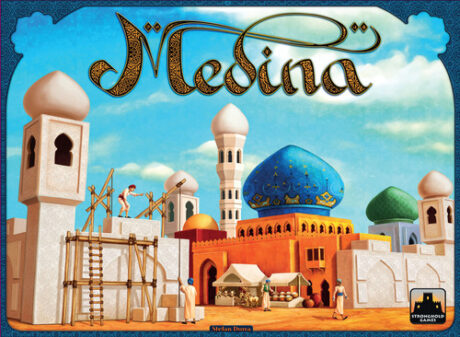
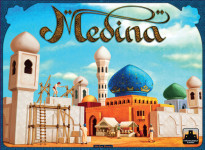
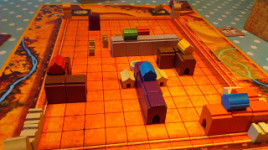
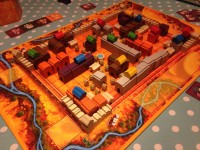
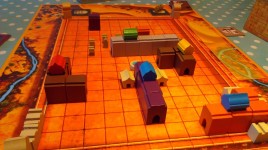
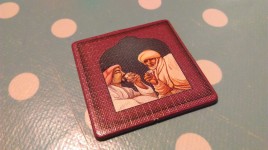


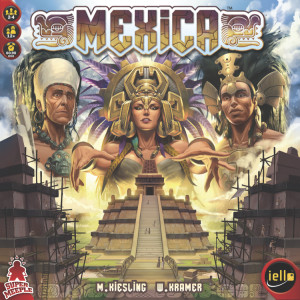



Sam says
My gaming preferences do err more towards a more thematic game - despite the alleged city-building theme, Medina is more of an abstract puzzle. But as an abstract puzzle I think it's one of the best - the tension involved in claiming a palace keeps things interesting and it contains abundant choices within its simple ruleset. If I'm in the mood for something like this (a combo of placing things and claiming them at the optimum moment) Medina and Mexica are my games of choice.